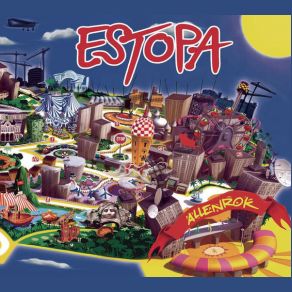Allenrok
Download links and information about Allenrok by Estopa. This album was released in 2008 and it belongs to Alternative Rock, Latin genres. It contains 12 tracks with total duration of 47:21 minutes.

|
|
|---|---|
| Artist: | Estopa |
| Release date: | 2008 |
| Genre: | Alternative Rock, Latin |
| Tracks: | 12 |
| Duration: | 47:21 |
| Buy it NOW at: | |
| Buy on iTunes $9.99 | |
| Buy on Amazon $9.99 | |
Tracks
[Edit]| No. | Title | Length |
|---|---|---|
| 1. | Cuando Amanece | 3:17 |
| 2. | Cuerpo Triste | 3:03 |
| 3. | Era | 3:02 |
| 4. | Rumba Ke Tumba | 3:07 |
| 5. | La Matraca | 3:41 |
| 6. | Desenpolvando | 3:58 |
| 7. | Descatalogando | 3:21 |
| 8. | Hemicraneal | 4:10 |
| 9. | Jugar al Despiste | 2:32 |
| 10. | El Run Run | 3:37 |
| 11. | Víentos de Tormenta | 3:16 |
| 12. | Pesadilla | 10:17 |
Details
[Edit]Brothers David and José Muñoz took their time with Allenrok, Estopa's sixth studio album and the first in three years after 2005's Voces de Ultrarrumba. The duo's popularity has not lessened a bit, with the record entering the Spanish charts at number one, staying at the top for several weeks, and quickly going platinum. While hardly a major departure from their previous work, there is enough evidence in Allenrok to suggest that the Muñoz brothers decided it was time to flex their musical muscles and to think harder about their proven modern rhumba formula — hence the longer gestation period. The album's first tracks pick up exactly where they had left, with their trademark fun mixture of the Catalan rhumba and rock idioms, and their urban tales about characters lost in love and/or alcohol and marijuana. Not coincidentally, tracks one and two are also Allenrok's first two singles, "Cuando Amanece" and "Cuerpo Triste." Little by little, however, things start to get more interesting, or at least certainly different, as songs begin to include entire sections done in contrasting styles. The results are remarkable in a musically schizophrenic way, but credit is due to Estopa for pulling it off and still sounding cohesive. The plan seems to be: let's lay out a rhumba background and then intersect it with everything but the kitchen sink. "Desempolvando," for instance, starts with a funk groove punctuated by hard rock guitar chops, then the verse becomes reggae, with the last phrase sung in a traditional flamenco style.
Similarly, "Jugar al Despiste" is, of all things, straight heavy metal music with flamenco phrasing on top. Another highlight, "La Matraca," is a Stonesy rhythm & blues, with harmonica and guitar riffs reminiscent of Tom Petty's "Breakdown," but is also flamenco and reggae, and in the chorus becomes rap, if you can imagine all that. There is a clear progression in the album, from the aforementioned trademark Estopa first tracks to the closer, "Pesadilla." This progression is also implied in the titles of the first and last song, from "when the day begins" to "nightmare." "Pesadilla" is an extended circus music number with echoes of both Tom Waits and the films of Tim Burton, a Kafka-esque tale about a man waking up in prison and cannot remember how he got there. Sure enough, flamenco guitars pop up in the choruses, and a reggae ghost track resurfaces after a few minutes of silence, as if to reinforce both of Allenrok's main tenets: first, that the traditional Estopa are never far away; and second, that the unexpected can happen at any given moment in this bottomless magician's hat of an album. Estopa's new joint ambitions are declared in the manifesto-like "Descatalogando," which from its very title announces the duo's refusal to being labeled — even if, ironically, the music this time is 100 percent rhumba flamenca. The same principle is formulated in reverse in "Rumbaketumba," a song about the joy of playing and singing rhumba all night long, and yet done in a hip-hop style with crunching distorted guitars, and then reggae.
With Allenrok, Estopa seem more dedicated than ever to mixing the global with the local, perhaps the most exciting path of early 21st century Latin music, as developed by artists such as Manu Chao, Café Tacuba, and Los Fabulosos Cadillacs. In a way, this intention is already present in the album's title, since "Allenrok" is the Muñoz brothers' hometown in Catalonia, Cornellá (also depicted in the cover art), written backwards and with a "k," to make it sound snappier. To be sure, Allenrok also has its fair share of more mainstream material, in the form of ballads and pop numbers ("Hemicraneal," "El Run Run") that highlight the influence of songwriters such as the duo's much admired Joaquín Sabina, or Andrés Calamaro. Allenrok's Achilles heel is, curiously, the songwriting itself: Estopa had already written dozens of songs about the same themes, and if the musical imagination on display is admirable, the songs fail to be especially memorable. Allenrok may not be as much instant fun as previous Estopa albums, but it definitely earns points for ambition. It remains to be seen whether Allenrok is a one-off experiment or the beginning of a new direction for Estopa. At any rate, the obvious impression is that this record was not conceived to be "just another album," but an important moment in the band's career.